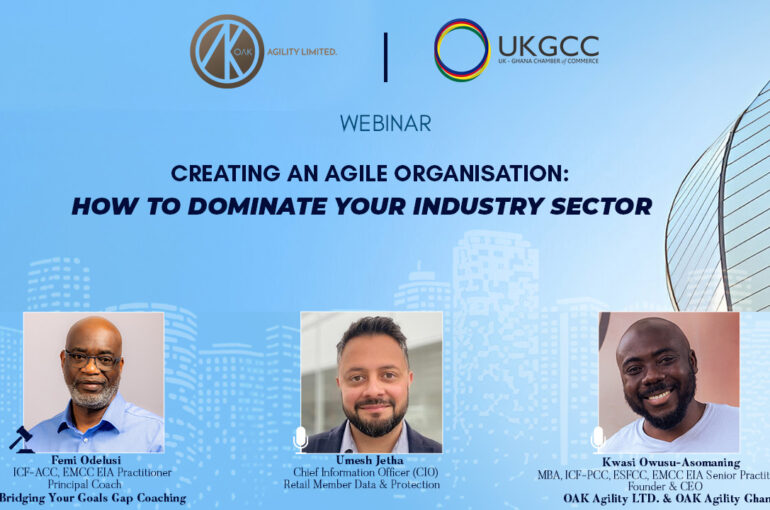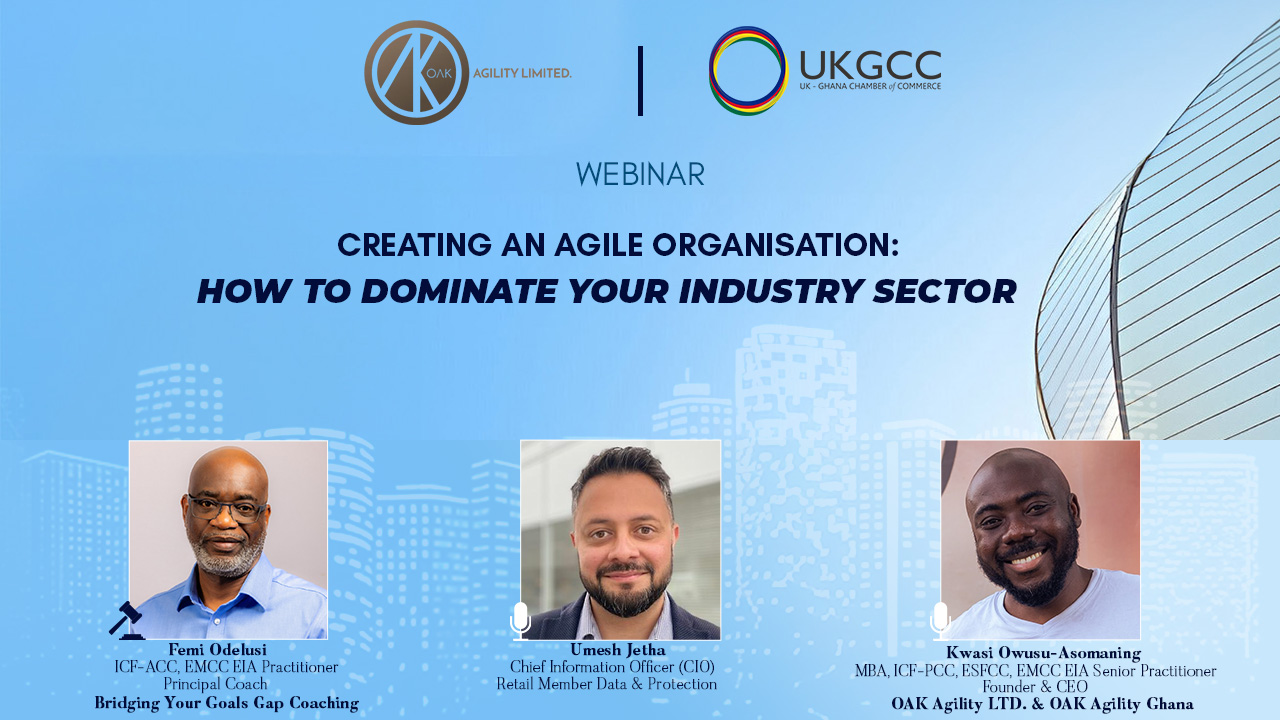Relentless pursuit of customer centricity key to business success – OAK Agility CEO
Relentless pursuit of customer centricity key to business success – OAK Agility CEO


Mr. Kwasi Owusu-Asomaning, a professional credentialled coach with the International Coach Federation (ICF) and CEO of OAK Agility LTD & OAK Agility Ghana, has remarked that several facets go into creating an Agile Organisation. One of the core facets is that a relentless pursuit of customer centricity underpins an agile organisation and sets a business up for success.
Speaking during the UK-Ghana Chamber of Commerce’s (UKGCC) webinar with OAK Agility LTD on “Creating an Agile Organisation: How to Dominate your Industry Sector”, Mr. Owusu-Asomaning added that agile organisations are also characterised by the relentless pursuit of value delivery and shortening the feedback loop between organisation and customer.
“Current consumption trends indicate that consumers have shortened attention spans, making it essential, vital almost, to shorten the feedback loop, as well as ensuring that you are delivering value. If you are not delivering the value, they will go elsewhere”.
He also identified a relentless pursuit to eliminate waste, a cultural fit where the people in the organisation are well looked after, and a people-first leadership as more factors that underpin an agile organisation, setting a business up for success.
What is Business Agility?
According to Umesh Jetha, a Chief Information Officer and panellist on the webinar, “agility is about how you are going to experiment to try to do things in a different way to try and maximise that human potential and move away from the 1940s style of management which still transpire in 2024.
“Being an agile organisation is about how you change the behaviours and the culture of your organisation”.
According to Mr. Jetha, if people are not agile in their mindset, an organisation will not be able to move towards agility.
Mr. Owusu-Asomaning concurred, adding that “the people element is key. Any organisation is as good as the way the people within the organisation are looked after. That focus enables everyone to step in and own the structures around them.
An agile organisation is customer-focused. Anything else is a distraction”.
Importance of business agility to the bottom line
Mr. Jetha noted that businesses should be agile because it allows them to react more quickly to change, allows them to serve customers relatively quickly, and it allows the business to pinpoint the source of issues and complaints and execute improvement solutions.
This adaptability can help organizations save on costs and maintain a competitive advantage.
In illustrating the power of business agility to the bottom line, Mr. Jetha recounted an experience he had working for a financial services institution when the COVID-19 pandemic struck. The institution demonstrated remarkable agility by implementing mortgage holidays for customers in just 13 minutes—a process that took other banks weeks or even months to achieve. “Because of the way we built and developed our agile team, we were able to make that change in 13 minutes,” he explained. This is the essence of Business Agility.
Taking your business into agility
Mr. Owusu-Asomaning advised businesses not to rush into going agile. There must, instead, be an understanding of why the business must go agile, and then “figure out what going agile would mean for the business. There needs to be intentionality and purpose, not a fashion trend”
Mr. Jetha added that businesses must also consider the investments that have to be made from both a leader and organisation’s perspective, to enable the move to agility.
They both maintained, however, that leaders must foster a culture of agility by involving teams in the process to bring more voices in including decision-making – a right balance of top-down and bottom-up, allowing them time to fix problems, and provide a purpose for the change to drive it.
“Leaders must take charge. Leaders must show vulnerability and be brave enough to say, ‘I don’t know but we will figure it out together”, Mr. Owusu-Asomaning opined.
He then urged businesses to get informed, seek knowledge, experiment, and seek expert guidance to help with the successful transition to business agility.
The webinar, moderated by Femi Odelusi, the Director of Education and Credentialing Standards for International Coaching Federation (ICF) Nigeria Charter Chapter, discussed related topics including common misconceptions about, and measurable improvements in performance and productivity in agile organisations.
Search
Archives



